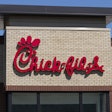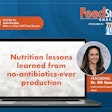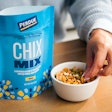
Like their customers, animal protein buyers for General Mills Inc. and ARCOP Inc. are keeping an eye on the latest global consumer food trends.
In a presentation at the October 2015 Oilseed & Grain Trade Summit in Minneapolis, Drew Lein, markets manager for global dairy sourcing at General Mills, and Rohil Shah, a senior buyer at the Arby’s supply chain cooperative, discussed how changing consumer preferences for sustainable farming practices and pressure created by the 2015 outbreak of highly pathogenic avian influenza are influencing the way they do business.
Minneapolis-based General Mills is one of the largest food manufacturers and marketers in the world, with $17.6 billion in net sales in the company’s fiscal 2015 and $8.6 billion in net sales through the first two quarters of fiscal 2016. ARCOP, an Atlanta-based nonprofit supply chain co-operative for Arby’s Restaurant Group Inc., spends about $1.3 billion annually keeping the fast-food chain’s more than 3,400 stores in the continental U.S. supplied.
Sustainability
Around the world, consumers are becoming more concerned with where their food is coming from, Lein said.
“Consumers want to know more about their food. There’s a perception that, at companies, it is bad. We get a bad rap for that,” Lein said. “Consumers want their food to be more sustainable.”
In response to the demand, Lein said General Mills is pushing to have its top 10 ingredients – corn, cocoa, wheat, dairy, sugar beets, oats, sugarcane, vanilla, palm oil and fiber packaging – sustainably sourced by 2020. Specifically, the company is aiming to have liquid milk to demonstrate continuous improvement in terms of greenhouse gas emissions, water and energy usage.
A slide from Lein’s presentation said 20 percent of the liquid milk General Mills purchased in its fiscal 2014 was sustainably sourced.
Shah said ARCOP’s leadership shares General Mills’ concerns about sustainability, and its leadership is involved in the U.S. Roundtable for Sustainable Beef, a recently formed industry group focused on improving beef sustainability.
Organic, antibiotic, hormone and GMO free
Scrutiny on sustainable practices is also raising questions about the introduction of antibiotics, hormones and genetically modified organisms (GMOs) in animal feeds and how that affects the composition of the food that finds its way to the table. In reaction, consumers are turning to organic products.
When asked which of these four issues are most persistent among U.S. consumers, Lein said demand for organic is pervasive, but it’s a small segment of consumers who are pushing for organic products.
Shah said addressing antibiotic use in animal feed is a high priority. In September, Arby’s, along with a host of other fast-food chains, was issued a failing grade in a report on antibiotic policies authored by environmental groups like the Natural Resources Defense Council. The U.S. Department of Agriculture is also taking steps to eliminate antibiotics in animal feed.
The use of GMOs is harder to stop. Shah said GMOs are already present in animal feed, and his organization cannot drive its use through its current supply chain.
Additionally, Shah said changing the supply chain to match up with these trends creates concern about whether there is enough product to go around.
“If we were to go antibiotic free on chicken or on poultry, is that a sustainable supply? If there was a hiccup, what do we do? Do we go back to something that’s not sustainable?” Shah said. “We can’t really go back on our core consumers as well.”
Shah said he sees organic as something the company will need to consider in the future. Lein said the growing demand in the organic segment is putting pressure on the company to vertically integrate its supply chain to increase the availability of organic options.
Market volatility
As usual, the volatile pricing of protein commodities is a concern for ARCOP, Shah said. He said the 2015 outbreak of avian influenza obviously affected his company as it influenced the availability and pricing of turkey and eggs. Arby’s, he said, had to react quickly to find new suppliers and change its product formulas to ensure the company could still serve turkey and egg products at its restaurants.
“Market volatility is always going to be a factor. If it wasn’t, I am sure us commodity guys would be out of a job,” Shah said. “So, the reality is price volatility is always going to be an integral part in our lives and what we do.”
The past few years, he said, have been dubbed a “perfect storm” of factors, where poultry, pork and beef all saw strong year-to-year pricing gains while the supply was limited. The steadily increasing prices, coupled with the shortages caused by avian influenza, have pushed ARCOP to continue on its mission to find new markets and look for new suppliers who can provide a product, and a consistent price, as consistently as possible.
General Mills Inc.
Founded: 1928
Employees: 43,000
Fiscal 2015 revenue: $17.6 billion
About: General Mills, based in Minneapolis, is a global food company that produces and markets cereals, doughs, dairy products and packaged foods.
Arby's Restaurant Group Inc.
Founded: 1964
Restaurants: 3,400 locations
About: Arby’s, based in Sandy Springs, Georgia, is owned by private-equity firm Roark Capital and The Wendy’s Company. Roark Capital owns the vast majority of the company. ARCOP Inc., Arby’s Supply Chain Co-operative, is in charge of supplying the restaurant’s ingredients.

















